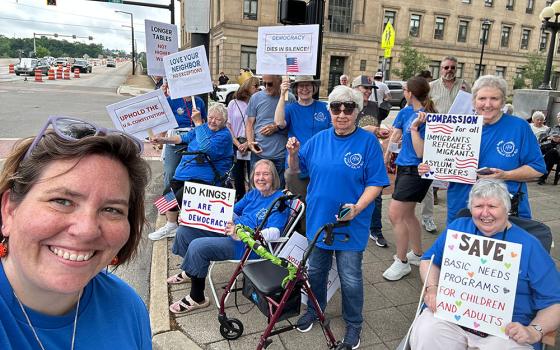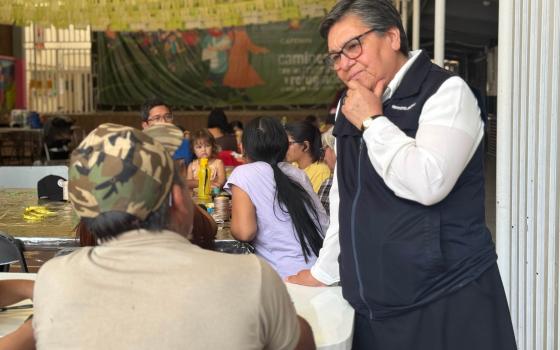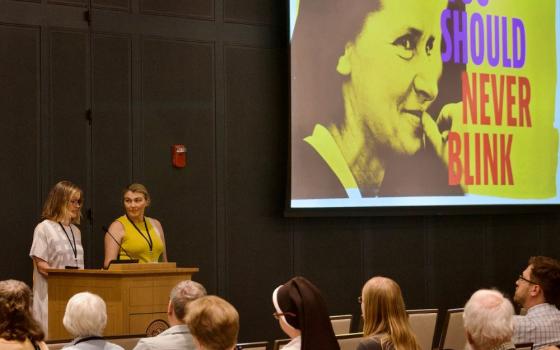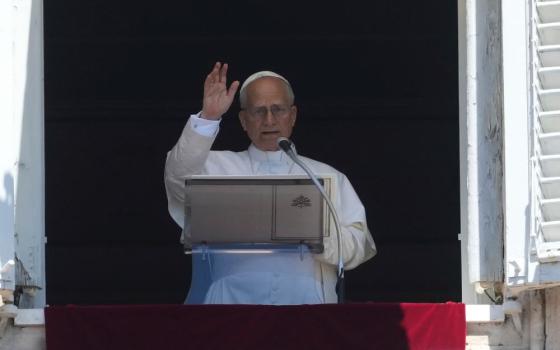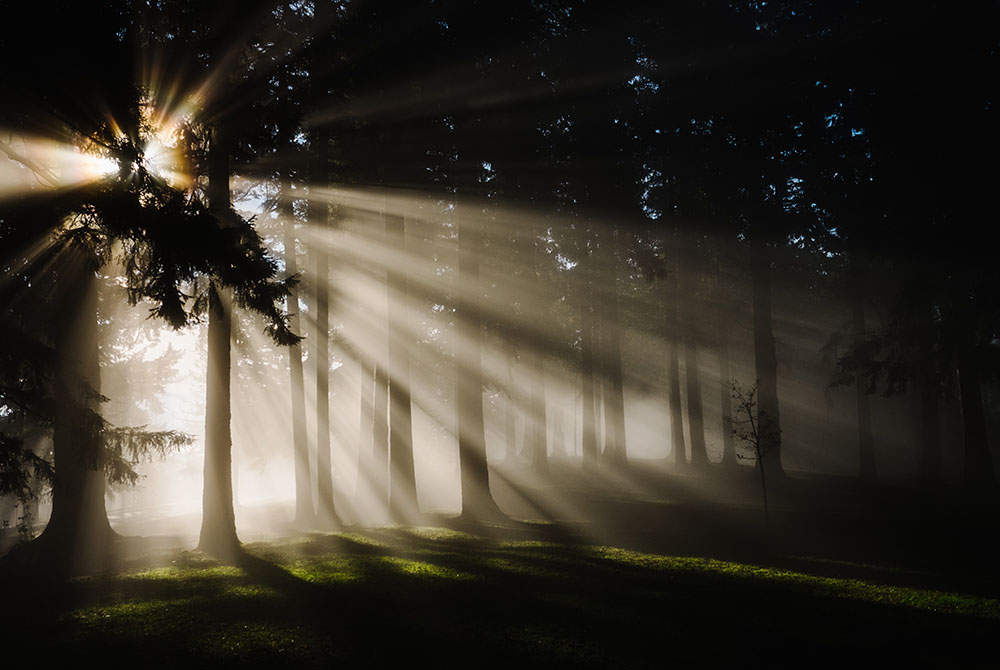
(Unsplash/Kristine Weilert)
At last, congregational leaders felt permission to grieve.
To grieve the pandemic's deaths, accompanying isolation, and bygone lifestyles — like many around the world. To grieve ministries, community rituals, and perhaps accelerated diminishment — unique to women religious.
"The pandemic has added another layer to what we were already dealing with, in the loss of members, loss of ministries, loss of friends in congregation as they age out and die," said Sr. Sharon Glumb, a member of the leadership team of the Sisters of the Living Word, in an interview with Global Sisters Report.
The second day of the annual assembly for the Leadership Conference of Women Religious (held virtually this year as a precaution against the coronavirus) offered a type of support group under the guise of a panel, Grief as a Catalyst for Transformation and Hope. The panel included three sisters who shared their meditations on the sorrow this year has ushered in, ranging from daily anxiety over loss of control, to mourning 14 deaths in a congregation already in 2020.

(GSR graphic/Soli Salgado)
Sisters participating in the assembly broke out into small groups of seven or eight following the panel, engaging in deep dialogue on the transformative potential of their individual and mutual grief.
As "meaning-makers," the popular epithet that sisters (particularly those in leadership) ascribe themselves, they view the LCWR assembly as an opportunity for sisters to cull insight, inspiration and anticipation from their collective contemplative energy. On Aug. 13, the invitation was to glean wisdom from grief.
Though this year's shift to an online gathering posed a challenge for establishing deep connections among sisters, the emotional group sessions proved they were able to transcend the barrier of computer screens and generate a heightened sense of solidarity through tears, reflections and words of encouragement.
As congregational leaders, "sometimes we have to show this brave face," said St. Agnes Sr. Jean Steffes, the general superior of her community, to Global Sisters Report. For her, this exchange felt like the "permission" leaders had been seeking to grieve. "Being with people who say how it's going for them in their communities, it helps us be free with our sisters, too. ... If it's hard, we don't have to pretend it's not."
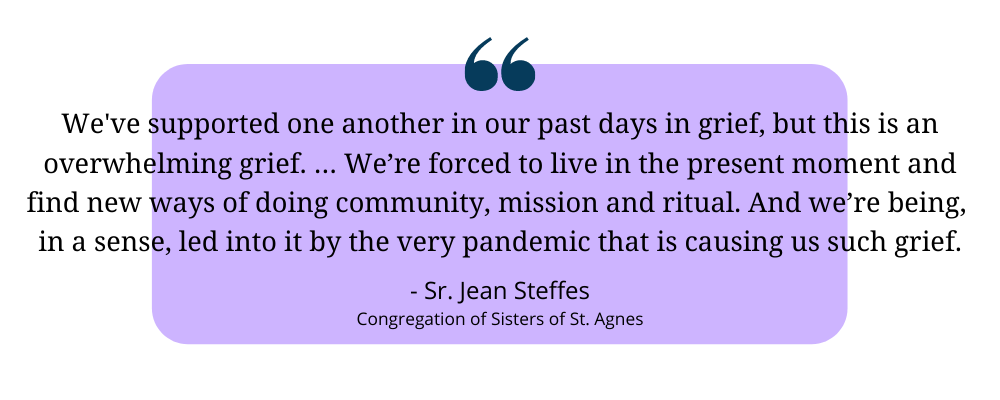
(GSR graphic/Soli Salgado)
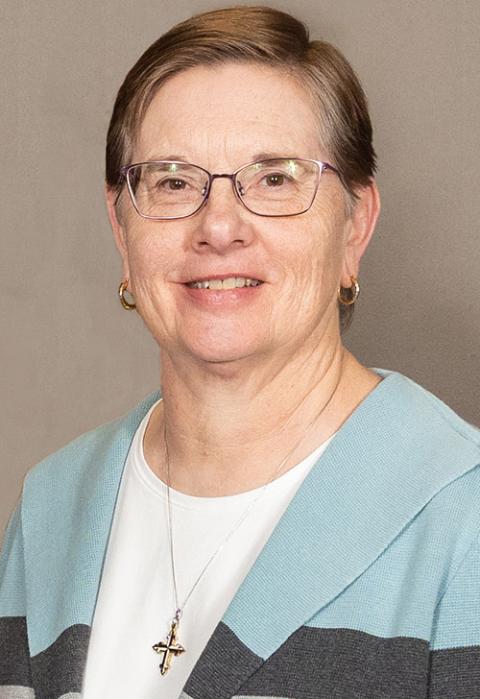
Dominican Sr. Maureen Geary (Provided photo)
Panel: 'Transformation is a choice'
Sr. Maureen Geary kept expecting to wake up from a dream. She'd spent weeks thinking, "this can't be happening," said the Dominican sister from Grand Rapids, Michigan. Opening the panel on grief, Geary addressed the assembly's 1,000 sisters and guests, focusing on the importance of being present in the "permanent now" that's been forced upon all, rather than the "momentary now" she's always perceived.
"It has become the 2020 now, and the pandemic now, and the racism and its devastating effects now," said Geary, who's on her congregation's leadership team.
Geary recalled the image of the women sitting faithfully next to Jesus' tomb, the stone still in place before the eventual miracle. In their waiting, they were "present to their now," said Geary.
"The space that grief creates is where God works transformation. For me this seems a slow transformation, and very incomplete. But I am being transformed, a little more each day in another permanent now," sitting by the "tombs of our day," looking for the light that seeps through the cracks between the stones.
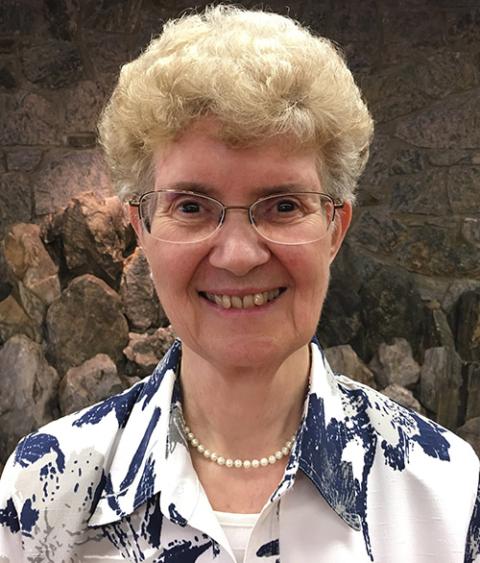
Sr. Antoinette Gutzler (Provided photo)
The second panelist, Maryknoll Sr. Antoinette Gutzler from Queens, New York, shared the devastation that her community has experienced this year: at least three sisters have died of COVID-19, while the congregation has lost a total of 14 sisters so far in 2020. They were unable to celebrate a single funeral or wake for those who died.
"A grief began to settle over me, a wrenching experience of learning to live and to let go in this unprecedented time," she said. "My tears are still close to the surface, but never shed for fear they may not stop."
Gutzler sees this as a "Spirit-led invitation" to journey through the "holy disquietude" that she's felt in spirituality, mission and identity.
Spiritually, the disruption is in not being able to pray together or to be with sisters as they die. And despite modernity of virtual Masses, Gutzler said, the experience takes her back to the days before Vatican II, the people "relegated to being observers at the Eucharist rather than participants. … COVID has laid bare the reality that, despite some changes, nothing has substantially changed in our church, even though we profess that all are 'equal in baptism.' "
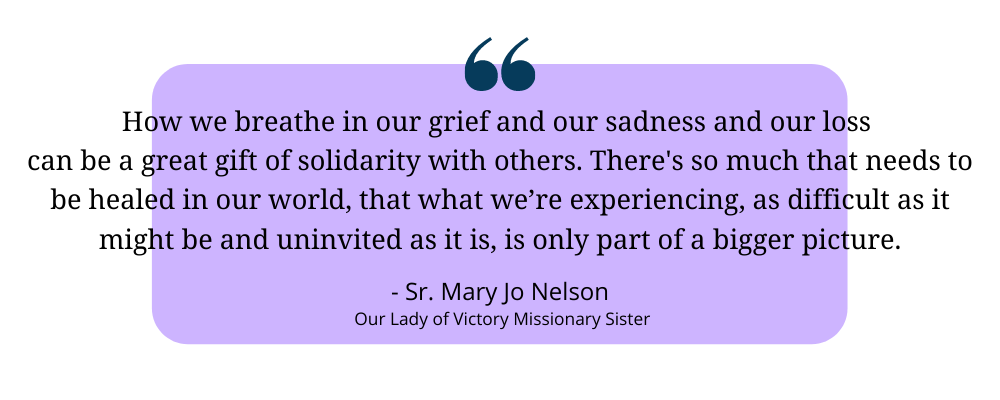
(GSR graphic/Soli Salgado)
The disrupted sense of mission and identity stems from the lack of action sisters are accustomed to taking in times of need, she said. But here Gutzler sees a two-pronged journey: one into grief for the familiar ways of mission that are now coming to completion, and another into transformation for a "life-giving era."
"Grief creates a space for us to co-create something new together with God," she said. "No one asks for grief. It comes unbidden. But transformation is a choice born from within the crucible of pain and uncertainty. It is a choice that demands nothing less than an unswerving courage and endurance to carry on."
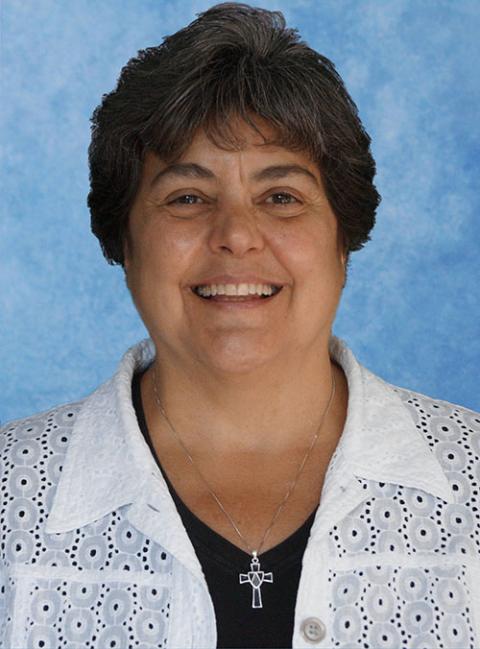
Sr. Rebecca Ann Gemma (Aaron Tebrinke/Dominican Sisters of Springfield, Illinois)
Dominican Sr. Rebecca Ann Gemma, the final panelist, said she eventually came to the realization that it is neither the responsibility nor the possibility of leadership to "fix" what is, but rather, "to promote healing as we see, listen and love," to reach the unseen and confused within their own communities.
As prioress of the Dominican Sisters of Springfield, Illinois, Gemma said she feels called to "challenge myself and my sisters to recognize how our engagement with one another affects the health and unity of all life. We are neither powerless, nor exempt, from our responsibilities toward all creation," a duty manifested in the belief that if one suffers, all suffer.
As Gemma's been struggling for months with feelings of inadequacy, loss and vulnerability, one maxim in particular has come to life for her: "Contemplate and give to others the fruits of your contemplation."
The fruits of her contemplation, she said, are not articulated in words, but rather, through a "deeper recognition of the Spirit's presence" in a suffering world, a trust that God is "fashioning something new in me, in religious life, and in all creation."
Advertisement
Small groups: Relief in solidarity
In lieu of the table discussions the assembly would ordinarily prompt, sisters were directed into virtual small groups to reflect on the panel and share their own experiences during the past several months of the pandemic — what some sisters described to GSR as "support groups." Designated speakers later encapsulated the exchanges with all participants.
One group focused on the "illusion of control," and the sense of powerlessness and inadequacy among sisters through this time of death, economic disparity, and racial violence, said Sr. Lucille Martínez, of Our Lady of Victory Missionary.
But some gained a sense of creativity in exchange for that control, as they've had to "rediscover our own priesthood" to lead liturgy and Gospel reflections on Sunday.
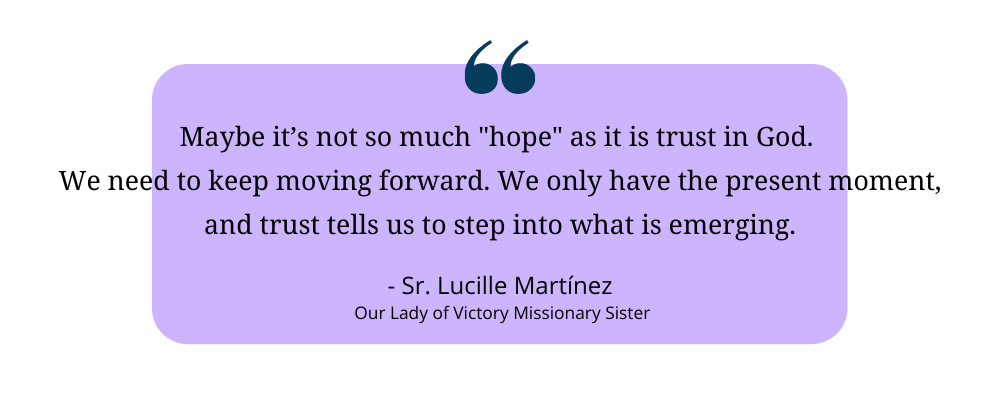
(GSR graphic/Soli Salgado)
Because deaths the past few months (whether related to the coronavirus or not) have largely gone without wakes or funerals, leaving people everywhere unable to celebrate the lives of the deceased, some sisters shared they feel "re-traumatized every time you experience another death, because the first one has not yet been put to rest," said Sr. Sean Peters, a Sister of St. Joseph of Carondelet.
They also anticipate "ongoing grief," as isolation has caused some of their sisters to lose their mental capacities or abilities to interact, she added.
But the sense of commonality and unity among congregational leaders, said Sr. Joy Peterson, inspired a "feeling of relief" as they shared with one another.
"An attentiveness to each other in this time [of sharing] was bringing great energy to our sense of unity and commonality and our awareness that the interconnection of all creation is at the root of all of our lives," said Peterson, a Presentation Sister of Dubuque, Iowa.
For some, hope has been met at times with disillusionment, said Divine Providence Sr. Donna Marie Gribshaw. As some turned to Scripture for solace, others looked for lessons in the experiences of their foundresses. Despite the pain of their times, "they kept going," Gribshaw said, demonstrating an "invitation to keep going into our future, as well," to encounter the new life emerging within themselves and their congregations.
Pain, letting go, the need to be seen, the desire for activism — everything, ultimately, is about relationships, said Kathy Stein, a Sister of St. Joseph of Carondelet of her group's reflections.
Through the pain of not being able to pray together, "we've realized how important that relationship is, and new ways that that can happen." In letting go of ministries, she said, they can now focus on mission, and how "no matter where we are or what we're doing, as we move into the future, our mission is alive and well."
One quote by philosopher Albert Camus encompassed the feelings shared in Stein's group: " 'In the midst of winter, I found there was, within me, an invincible summer.' "
St. Agnes Sr. Cyndi Nienhaus said she noticed a shift in energy between the day's two small group conversations. Earlier, there was a "heaviness in the air" as they shared their realities during the pandemic and their vulnerability as leaders.
But later in the discussions around grief, "it seemed the heaviness in our minds and hearts was transformed into a commitment towards discovering what is most important in our lives," the value of the present moment, contemplation, and "staying with our feelings without judgment."
In considering the session's theme, that grief is a catalyst for transformation and hope, one sister thought, "well, I wish I knew how," shared Sr. Elizabeth Langmead, a Mission Helper of the Sacred Heart. But in bonding over the ambiguity, Langmead said, "It is as if we are rediscovering each other as sisters in community, as sisters in inter-community, as women in the world accompanying each other in a new way."
Grief, the "foundation of the hope that we hold," is challenging them "to live, to love, and to be near," she said. "We value staying with the feelings of sadness and grief and to have patience." Meaning, they believe, is found in the "collective soul," where the work of addressing systemic racism and new ways to lead await them.
Speaking to their communal grief over death, change and racial injustice, Langmead closed with a quote commonly attributed to St. Augustine:
"Hope has two daughters: anger and courage. Anger at the way things are, and courage to see that they do not remain as they are."
[Soli Salgado is a staff writer for Global Sisters Report. Follow her on Twitter @soli_salgado. Her email address is ssalgado@ncronline.org.]
*This story has been updated to correct a photo credit.

